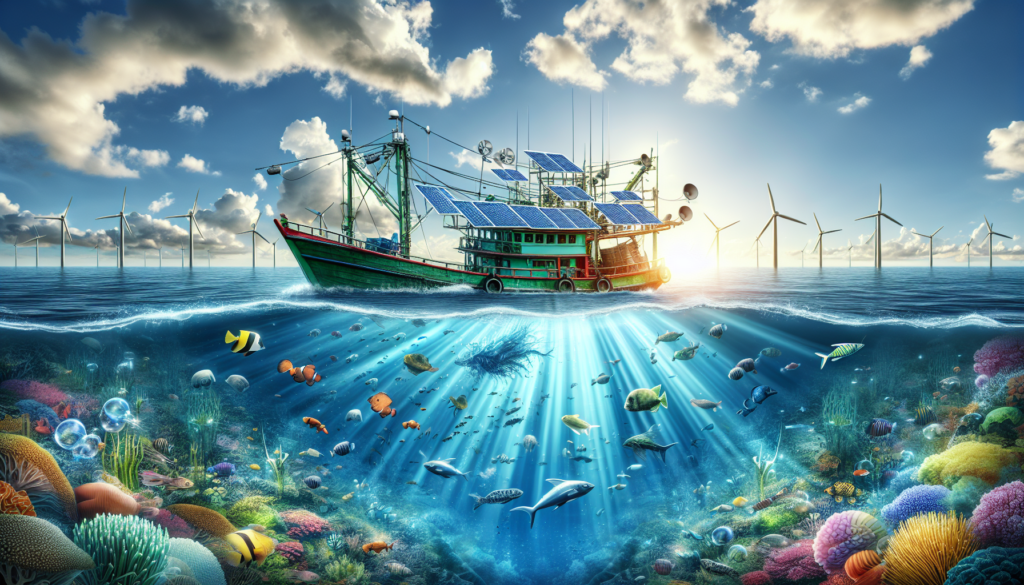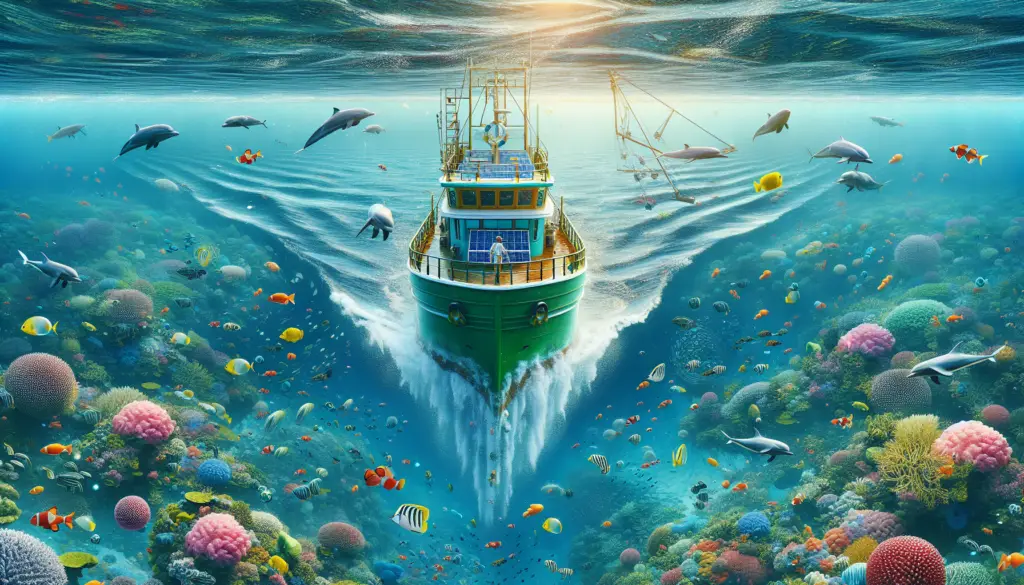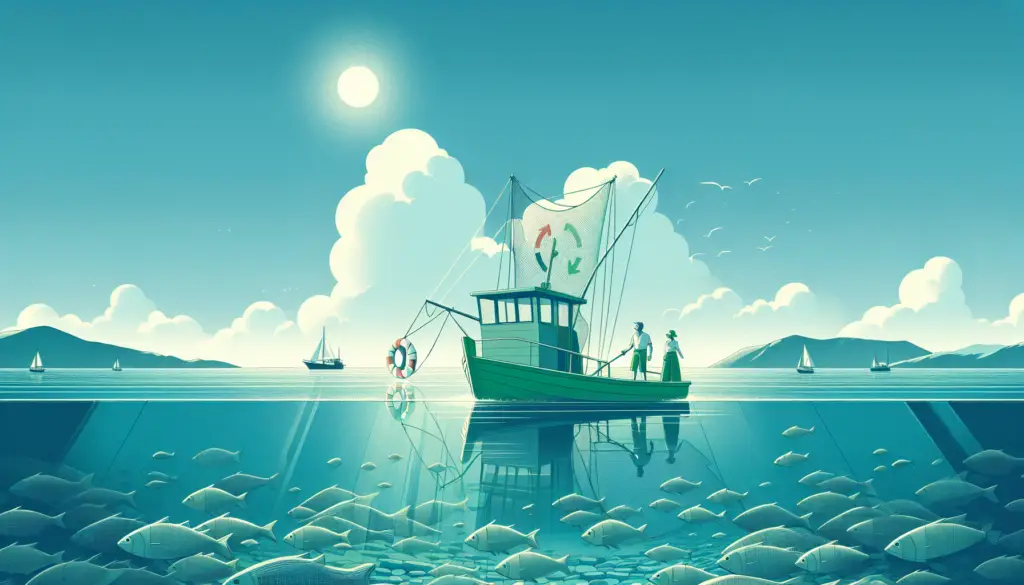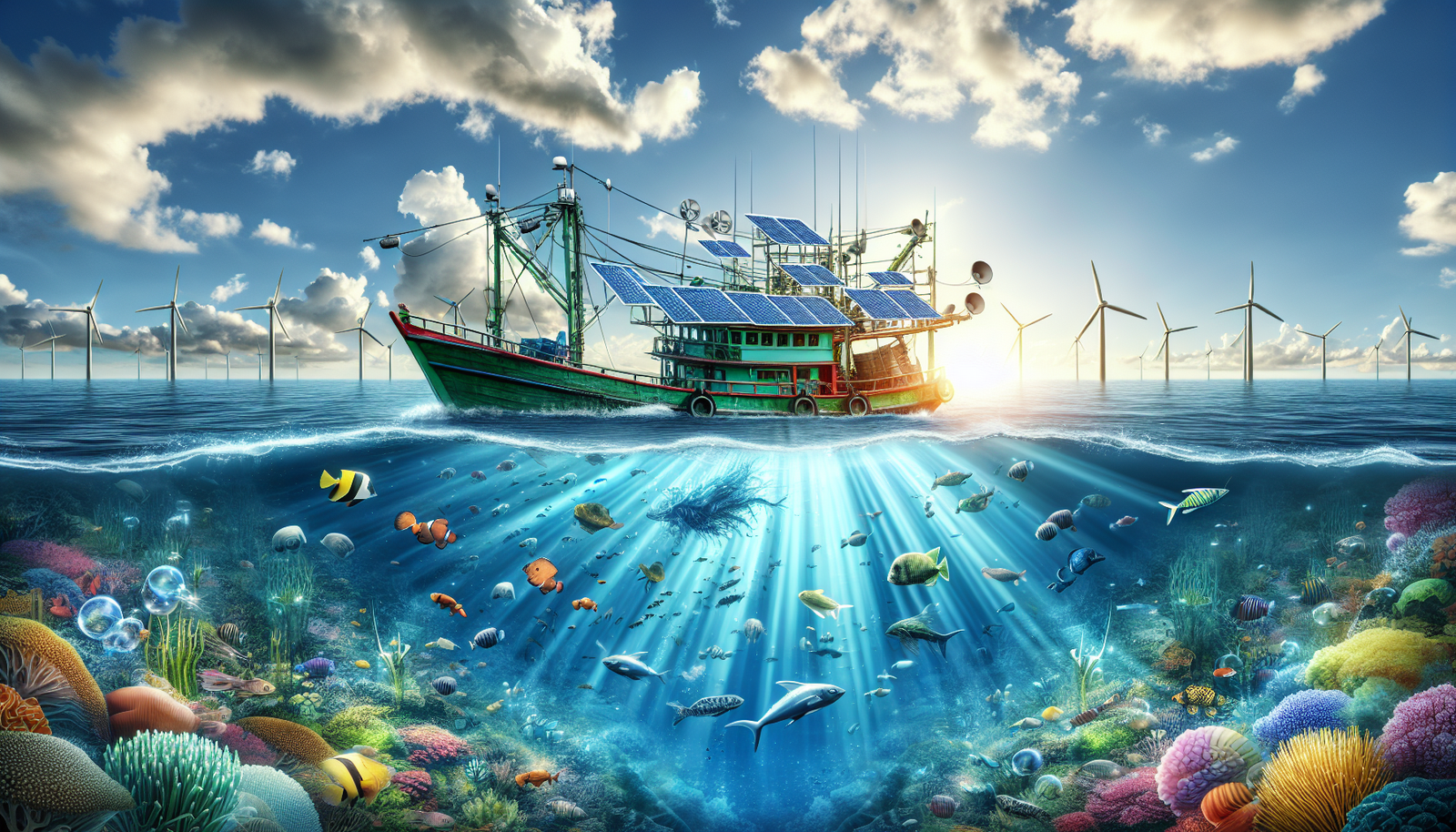Drawing from your passion for the sea and its rich aquatic life, this article puts into perspective the importance of sustainable fisheries and how eco-friendly boating can play a role in this. You, as an enthusiast or professional in this field, will learn how going green on the water can significantly impact the future of fish populations. The features and benefits of eco-friendly boating highlighted in the piece will give you cogent insights into how you can support and promote environmentally conservative fishing practices while enjoying the splendid beauty of the world beneath the water surface.

Understanding Sustainable Fisheries
In simple terms, sustainable fisheries are those that are managed in a manner that allows future generations to enjoy the same level of fish resources as we do today. This concept involves strategies that respect the preservation of marine biodiversity, life cycles of fish, and ecosystem resilience while ensuring economic viability. It’s more than just good ethical practices—sustainable fisheries carry implications that go beyond the fishing community.
Defining sustainable fisheries
Sustainable fisheries refer to fishing practices that can maintain their productivity and usefulness to society indefinitely. They do not overexploit the fish population, thereby enabling the species to sustain itself. The overriding goal of sustainable fisheries is to harvest fish in a manner that does not jeopardize the health of the fish population or disturb the delicate balance of the aquatic ecosystem.
The role of sustainable fisheries in maintaining ecological balance
Sustainable fisheries play a vital role in maintaining ecological balance. Overfishing can lead to the decline of certain species, thereby upsetting the ecological balance as the predator-prey dynamics get negatively impacted. Sustainable fishing practices help preserve the biodiversity of the aquatic environment, ensuring that life thrives beneath the waves just as it does on land.
Importance of fisheries in the global economy
Fisheries are a significant sector of the global economy, providing an essential source of protein for billions and offering employment and livelihood to millions worldwide. Beyond the local fishing communities, fisheries have a multiplier effect on the global economy through sectors like processing, marketing, and transportation of fish products, making their sustainability crucial for economic well-being.
Impact of Unregulated Fishing on Marine Ecosystems
Unregulated fishing exerts a damaging impact on marine ecosystems. From habitat destruction to species extinction and the subsequent economic implications, the effects are far-reaching and devastating.
Destruction of marine habitat due to unregulated fishing
Non-regulated fishing activities often employ destructive methods such as bottom trawling, which ravages the marine floor, demolishing the habitats of many aquatic species. This habitat destruction leads to a decline in species diversity and can have cascading effects on the marine food web.
Species extinction due to overfishing
Unregulated fishing has pushed many fish species to the brink of extinction. Overfishing depletes fish populations faster than they can reproduce, leading not just to the decline of targeted species but also the ‘bycatch’ species – species that are unintentionally caught, which further drives down biodiversity.
Economic implications of unregulated fishing practices
Unregulated fishing, with its temporary abundance, might seem lucrative initially. However, the long-term economic implications are dire. As fish populations diminish, the industries relying on it suffer. The job losses ripple across fishing industries, processing plants, markets, and tourism, leading to economic decline in fishing-dependent communities.

The Link Between Boating and Fisheries
Boating activities are intrinsically tied to fisheries. They have both direct and indirect impacts on aquatic life and contribute to the sustainability, or lack thereof, in the fishing industry.
Effects of boating activities on aquatic life
Boating activities can negatively affect aquatic life. Boat propellers can injure or kill marine life directly, while the noise and disturbance can disrupt fish behaviors, leading to stress, decreased reproduction, and changes in habitats.
Pollution caused by traditional boating practices
Traditional boating practices often lead to marine pollution through fuel spills, waste discharge, and release of harmful paints and coatings used on boats. This pollution threatens the health of fish and other marine species, potentially reducing their populations and making fishing less productive.
How unregulated boating contributes to unsustainable fishing
Unregulated boating can contribute to unsustainable fishing by enabling and facilitating illegal fishing practices. Fast, motorized boats can venture further off the coast to exploit fish populations and can also allow for the use of harmful fishing methods that catch vast numbers of non-target species.
Understanding Eco-Friendly Boating
Switching to eco-friendly boating is a proactive approach to conserve our marine ecosystems and sustain the fishing industry.
Defining eco-friendly boating
Eco-friendly boating involves practices that reduce the boater’s impact on the marine environment. This includes using boats that are powered by renewable energy sources, minimizing waste and pollution, and adopting navigational practices that limit disturbance to aquatic life.
Different aspects of eco-friendly boating
Eco-friendly boating covers a wide spectrum of activities, from choosing green technologies to adopting eco-conscious behaviors. It might involve selecting a hybrid or electric boat, using non-toxic cleaning products, implementing waste disposal and recycling programs, or just observing slower speeds to prevent harm to marine life.
Benefits of shifting towards eco-friendly boating
Adopting eco-friendly boating mitigates the harmful impacts traditional boating can have on marine ecosystems. It promotes cleaner waters, preserves biodiversity, and contributes to the sustainability of fisheries. An added advantage is the potential for cost savings, especially with energy-efficient boats and practices.

Promotion of Eco-Friendly Boating
Eco-friendly boating cannot take off without concerted efforts from governments, marine institutions, and the individual boater. Awareness campaigns and encouraging efficient practices are fundamental aspects of this process.
Government initiatives promoting eco-friendly boating
Governments worldwide are initiating measures to promote eco-friendly boating. These include implementing legislation to curb pollution from boats, incentives for upgrading to greener boats, and establishing marine protected areas where boating activities are regulated.
Awareness campaigns about benefits of eco-friendly boating
Awareness campaigns play a critical role in promoting green boating. These campaigns not only inform boaters about the potential harm their activities can cause, but they also provide practical tips and guidelines to transition towards more sustainable practices.
Role of marine institutions in promoting eco-friendly boating
Marine institutions play a pivotal role in promoting eco-friendly boating through research, education, and regulations. They develop, test, and advocate for green technologies, educate boaters and the public about environmental impacts, and enforce sustainable policies and practices.
Introducing Eco-Friendly Technologies in Boating
The adoption of green technologies in boating is integral to making boating more sustainable and less harmful to the marine environment.
Types of green technologies suitable for boating
Existing and emerging green technologies for boating include electric propulsion systems, solar panels for on-board energy needs, biodegradable products to replace plastic, and fuel-efficient engines that emit fewer greenhouse gases.
Innovations in eco-friendly boat designs and engines
Boat designs are being innovatively modified to improve energy efficiency. Hull designs that reduce drag, lightweight materials that reduce fuel consumption, and hybrid or fully electric engines are just a few of the advancements. Additionally, more effective sewage treatment systems and waste management procedures are being put in place on boats.
Examples of successful implementation of green technologies in boating
Successful examples of green technologies abound within the boating industry. Electric boats and solar-powered boats are increasingly common, and many boats now have recycling systems on board. The adoption of these technologies has helped reduce pollution, conserve energy, and move closer to sustainable boating practices.

Strategies for Implementing Eco-Friendly Boating Practices
Implementing eco-friendly boating practices involves a multi-faceted approach that looks at energy use, waste management, and education.
Adoption of renewable energy sources in boating
Shifting to renewable energy sources is at the forefront of eco-friendly boating. This could involve using solar power, installing wind generators, or switching to hybrid or electric engines that are vastly more efficient and cleaner for the environment.
Waste management and recycling in boats
Effective waste management is another critical aspect. Implementing recycling programs, using non-toxic products, and ensuring proper treatment and disposal of sewage can significantly reduce pollution from boats.
Educating boaters for responsible boating
Responsibility begins with awareness. Education programs aimed at boaters can teach them about the impacts of their activities and how to adopt greener habits. This can evolve from information sessions, training programs, and promoting a culture of respect for the marine environment.
Promoting Sustainable Fisheries Through Eco-Friendly Boating
Promoting sustainable fisheries through eco-friendly boating is a logical and beneficial step. It underscores the symbiotic relationship between fisheries and boating practices.
Importance of eco-friendly boating in sustainable fisheries
Eco-friendly boating is vital for sustainable fisheries. Clean waters, thriving marine life, and balanced ecosystems are the foundation of productive fisheries. By mitigating pollution, reducing disturbance to aquatic life, and discouraging illegal fishing practices, eco-friendly boating contributes significantly to sustainable fishing.
The role of governments and organizations in integrating boating and fisheries
Governments and organizations can play a pivotal role in bridging the gap between boating and fisheries. They can enforce regulations that promote eco-friendly boating, provide incentives for sustainable fishing and boating practices, and foster cooperation between boaters and fishermen for mutual benefits.
Case studies showing positive impacts of eco-friendly boating on fisheries
Case studies across the globe demonstrate the positive effects of eco-friendly boating on fisheries. Regions that have implemented green boating initiatives often report healthier fish populations, a resurgence in species that were declining, and improved yields for fisheries, thereby showing a clear win-win scenario.
Challenges in Promoting Eco-Friendly Boating and Sustainable Fisheries
Despite the apparent advantages, promoting eco-friendly boating and sustainable fisheries is not without challenges. Economic obstacles, resistance to change, and regulatory hurdles often stand in the way of progress.
Resistance from traditional boating industry
The transition to eco-friendly boating can meet resistance from the traditional boating industry. The hesitance can stem from the cost of upgrading equipment, a lack of understanding, or a reluctance to adapt to new ways.
Economic challenges in adopting green technologies
The initial investment in green technologies can be high, making it a deterrent for many. While the long-term benefits and cost savings are significant, the short-term financial burden can be a major setback for individuals and businesses.
Hurdles in applying sustainable fishing regulations
Sustainable fishing regulations are often difficult to enforce, especially in international waters. Compliance depends largely on the willingness of the fishing industry and individual fishermen, and there can be considerable resistance due to perceived economic drawbacks.
Future of Eco-Friendly Boating and Sustainable Fisheries
With increasing awareness and technological advancements, the future of eco-friendly boating and sustainable fisheries looks promising.
Projected growth and opportunities in eco-friendly boating
The market for eco-friendly boating is projected to grow exponentially in the coming years. As the benefits become more apparent, and green technologies become more affordable, more people are expected to transition to eco-friendly boating, presenting substantial opportunities for both manufacturers and consumers.
Anticipated improvements in sustainable fisheries
With better practices in place and wider adoption of sustainable methods, fisheries are likely to see improvements on many fronts. Healthier fish populations, increased biodiversity, and a more balanced marine ecosystem are among the anticipated benefits, leading to a more productive and resilient fisheries sector.
Final word on the significance of eco-friendly boating in promoting sustainable fisheries
In conclusion, eco-friendly boating has a significant role to play in promoting sustainable fisheries. By reducing our impact on the marine environment, we help ensure the health and productivity of our waters, which in turn support the sustainability of fisheries. It is a cycle of mutual benefits that reflects the interconnectedness of all life on our planet. There’s no better time to embrace eco-friendly boating practices than now. Let’s set sail for sustainable waters!

